Cuba - Fully open for business?
Cuba is a beautiful location for filmmakers, with distinctive colonial buildings, over 200 stunning white sand beaches and plenty of areas of unspoiled natural beauty. All this is combined with an average of 330 days of sunshine per year, and a warm, culturally diverse population.
By Josh Wilson 27 Mar 2015

Cuba is a beautiful location for filmmakers, with distinctive colonial buildings, over 200 stunning white sand beaches and plenty of areas of unspoiled natural beauty. All this is combined with an average of 330 days of sunshine per year, and a warm, culturally diverse population.
These attractions clearly appealed to director Bob Yari’s feature Papa, which has just wrapped, becoming the first film to be shot in Cuba since the 1959 revolution. Papa, the story of Hemingway’s friendship with a young journalist, starring Giovanni Ribisi and Adrian Sparks, received exemption from America's six-decade embargo.
The only exception to this embargo was Oliver Stone’s 2002 documentary project Looking for Fidel; the director was fined by the US government for filming in Cuba without the proper permissions.
We thought with the completion of Papa, and the island nation becoming more accessible for international filmmakers, it might be a good time to run through some tips and tricks for filmmakers considering shooting on the Caribbean island.
Cash is king
Pack plenty of cash. Few local businesses can accept credit or debit cards and there are two types of pesos, one for visitors and one for residents. They have different exchange rates so watch out for which currency a price is quoted in.
Bring extra batteries & equipment
Modern film equipment can now be more easily accessed in Cuba, however for independent filmmakers on a strict budget, proper planning is very important before travelling. If an item in your kit breaks, it can be difficult to find the correct parts to fix it, so it’s important to ensure you come prepared with replacement parts if your production will be shooting for an extended period.
Hire a translator
Most people in Cuba do not speak English. Hire a translator to save you from having to use mock sign language or waste valuable time trying to make yourself understood.
Contact the film commission for advice
The main institution for filmmaking in Cuba is the Instituto Cubano de Arte e Industria Cinematográficos (The Cuban Institute of Cinematographic Art and Industry or ICAIC), a state organisation established in, coincidentally, 1959.
During our panel at BVE recently top industry panellists also provided some handy advice for filming abroad which could also apply to Cuba, including:
“[In very warm conditions] You cannot pack too many hats!”
“Be careful not to use colloquialisms or slang when speaking English to a foreign crew.”
“Be open and honest with anybody you encounter when filming abroad.”
The only exception to this embargo was Oliver Stone’s 2002 documentary project Looking for Fidel; the director was fined by the US government for filming in Cuba without the proper permissions.
We thought with the completion of Papa, and the island nation becoming more accessible for international filmmakers, it might be a good time to run through some tips and tricks for filmmakers considering shooting on the Caribbean island.
Cash is king
Pack plenty of cash. Few local businesses can accept credit or debit cards and there are two types of pesos, one for visitors and one for residents. They have different exchange rates so watch out for which currency a price is quoted in.
Bring extra batteries & equipment
Modern film equipment can now be more easily accessed in Cuba, however for independent filmmakers on a strict budget, proper planning is very important before travelling. If an item in your kit breaks, it can be difficult to find the correct parts to fix it, so it’s important to ensure you come prepared with replacement parts if your production will be shooting for an extended period.
Hire a translator
Most people in Cuba do not speak English. Hire a translator to save you from having to use mock sign language or waste valuable time trying to make yourself understood.
Contact the film commission for advice
The main institution for filmmaking in Cuba is the Instituto Cubano de Arte e Industria Cinematográficos (The Cuban Institute of Cinematographic Art and Industry or ICAIC), a state organisation established in, coincidentally, 1959.
During our panel at BVE recently top industry panellists also provided some handy advice for filming abroad which could also apply to Cuba, including:
“[In very warm conditions] You cannot pack too many hats!”
“Be careful not to use colloquialisms or slang when speaking English to a foreign crew.”
“Be open and honest with anybody you encounter when filming abroad.”
Latest news & features
Featured profiles
Promote your services with KFTV
Choose from three profile types - Basic, Silver and Gold
Create ProfileWe offer a range of display advertising opportunities.
Learn More